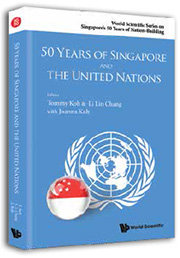ASIA MEDIA WRITES: Singapore has been marking the 50th anniversary of its independence in many distinctive ways. One is with the launch of a book on the United Nations – on the 70th anniversary of its founding — that needs to be added to the short list of truly great books about the UN.
Titled (rather un-snappily, given the excellent and often lively content – why do so many publishers equate boring with responsible?!), ’50 Years of Singapore and the United Nations,’ the collection of essays offers true and rare insight onto how the UN really works. As the Singapore-based publisher puts it:
“The volume brings together 45 essays by Singaporeans who have made or are making important contributions to the work of the UN system. The reader will be able to learn about the UN as seen through the eyes of Singaporeans who have served as Ambassadors to the United Nations in New York and Geneva, the World Trade Organization, or as professional staff in the various specialised agencies, programmes and funds that are part of the UN.”
In addition to being a fairly justified celebration of little Singapore’s relentless efforts to play an over-sized role at the UN in New York, the book reveals in telling detail the Leviathan-like dominance of the Security Council’s ‘Permanent 5,’ and the struggle of the many smaller nations to level the paying field. Its contributors include Kishore Mahbubani, the dean of the Lee Kuan Yew School of Public Policy and one of Singapore’s true global voices.
As UN Secretary General Ban Ki-moon aptly notes in the book’s opening message, “No nation, regardless of size or strength, can solve all problems on its own. We need to think and act collectively. Singapore gets it.”
Ban himself – a former South Korean foreign minister – has laid out some of his own salient and candid thoughts in the need for UN improvement and reform in the well-reviewed 2012 book ‘Conversations with Ban Ki-moon,’ the fourth volume in the Giants of Asia series published by Marshall Cavendish International. This new book – edited by distinguished former UN ambassador Tommy Koh and others – adds immeasurably to our understanding of this enigmatic, troubling but essential international organization.

